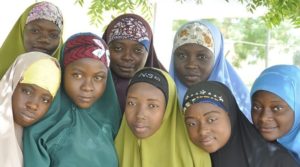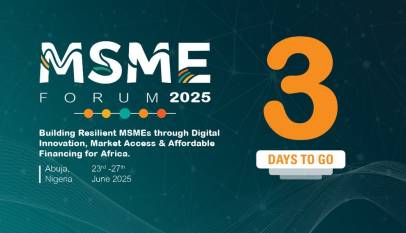M4D: Mobilizing inclusive action for better Nigerian communities
The UK Department for International Development’s Mobilising for Development project is mobilising policymakers and citizens of communities in northern Nigeria, including girls and People With Disabilities, to acquire the necessary skills to be able to work with one another towards bettering their communities

Sustainable development could only be achieved when the closest arm of government to the people is able to cater for their needs. In the absence of accountable and responsive service providers at local levels in Nigeria, poverty and ignorance has become the bane of most local communities and hence their high levels of underdevelopment.
And so until people at the grassroots are educated and informed enough to realize the need to mobilize and act collectively in coming up with efficient mechanisms that will ensure they continuously and sustainably engage policymakers and make them accountable, local communities will remain poor and undeveloped.
As such, the dearth of development at the grassroots could largely be blamed on lack of active community participation in governance processes at local levels, a development that is not unconnected with the lack of awareness and skills to effectively engage with policymakers by people at the grassroots.
In Nigeria, the absence of a clear-cut mechanism for sustained engagement with leaders at local levels by citizens and community based organizations, CBOs, has resulted in a situation where the local government is where leaders’ and service providers’ accountability to the governed is most lowest.
Against this backdrop, the UK Department for International Development’s Mobilising for Development, M4D, project, a pioneering governance program, is aimed at improving equitable access to quality basic services and accountability at the local level. The grassroots-focused project’s strategy is that of working with communities, marginalized groups, policy makers and service providers across nine (9) local government areas of Kaduna, Kano and Jigawa states, in northwestern Nigeria.
The LGAs include Miga, Malam Madori and Ringim in Jigawa state and Kudan, Igabi and Kachia in Kaduna state, as well as Sumaila, Dawakin Tofa, and Garun Malam in Kano state.
M4D is achieving this by strengthening and working with Community Based Organizations, CBOs, and People Living with Disabilities, PWDs, at ward and local government levels to enhance community engagement and demand; promote inclusion, with a special focus on girls and PWDs, by supporting life skills clubs and forums for girls. The project supports better service delivery and accountability by strengthening the capacity of local and state service providers and policy makers towards more inclusive practices, clearer standards and improved responsiveness.
“M4D has brought innovative development strategies we didn’t have in our community before,” said Rukayya Hussani, a graduate of M4D’s Life Skills Forum, LSF, an innovative approach for mobilizing and empowering girls. “We learnt several skills including communication, conflict resolution, entrepreneurship and financial management. Now that we have been graduated we are given raw materials to put to use the skills we have acquired so as to be economically independent.”
Young Rukayya, who is one of the beneficiaries of M4D’s life skills forums where the girls are mentored in civic education; needs analysis; communications; negotiation; leadership; financial management; conflict management, and entrepreneurship learnt the making of perfume and air freshener.
She was speaking during their graduation ceremony in Garun Malam local government of Kano state, one of the 9 M4D LGAs in northern Nigeria, and which is infamous for sending girls to work as house helps all over Nigeria, in cities as far as Lagos and Port Harcourt in the country’s southern region.
African Newspage’s findings reveal another important aspect of mentoring at M4D’s life skills forums, as other than mentorship for entrepreneurial skills, the mentees are also mentored in strategic communications to be able to engage with policymakers and service providers at the grassroots, by effectively articulating their demands via a platform known as the Girls Platform.
“Now as a result of the skills we have acquired through our engagement with M4D, we are able to actively participate in community discussions on issues relating to governance; which was not the case before M4D came here,” said Rukayya Hussaini, one of the girl peer champions from the Girls’ Platform articulating the girls’ demands to local policymakers and service providers in Garun Malam.
“When I finished secondary school I wasn’t interested in furthering my education,” Rukayya told African Newspage. “Now with the support of M4D, I am studying at the Sa’adatu Rimi College of Education, Kano. I hope to use the knowledge and entrepreneurial skills I acquired through M4D for the betterment of my community.”
Also speaking during the graduation ceremony, Abubakar Gwadabe Buhari, district head of Garun Malam, decried the unfortunate situation whereby girls from the LGA are known for being sent to cities like Abuja, Lagos and Port Harcourt to work as house helps adding that he was trying his best to arrest the trend. He described women’s education as critical to the development of all societies.
“All developed societies have as their backbone educated women; educating women is critical to their development. If you educate one woman you are educating a community as she will give birth to children and train them to be morally upright. If we educate our women our society will be free from poverty and ignorance, therefore empowering women is of great benefit to our society,” he said.
Buhari who said he had to set up a committee to arrest the trend of sending girls from Garun Malam to various Nigerian cities to work as domestic helps stated that the committee had succeeded in returning about 86 girls back to their communities adding that he was now grappling with the challenge of wives of influential Nigerians coming after the girls, after they have been returned home.
“We therefore had to come up with an agreement with such women,” he said. “That if they must take those girls back to their houses they can only do so if they would ensure they educate them up to university level as well as help them find work and a good husband. This is because such girls find it difficult reintegrating with their communities after living in the city for a long time and being exposed to modern lifestyle.”
Sa’adu Abashe, the chairman of Garun Malam local government area who was also at the girls’ graduation ceremony expressed his appreciation to M4D for training policymakers in the LGA on leadership and governance skills. He applauded the M4D for “promoting how leaders can be of benefit to their people”. “We now know how to lead effectively. Before we saw CBOs as our adversaries, we have now realized that they are only helping us to do our work,” said Abashe.
“Life skills are as important as education; don’t throw them away, we will also give you take-up grants to support you,” he urged the girls beneficiaries.
While also addressing the graduates, Francis Johnston, M4D’s team lead, urged the girls not to abandon the skills they acquired and also admonished their community’s leaders on the need to support the girls to be able to sustain the skills they had acquired even when M4D was over.
“This is not about M4D,” Johnston said. “This is about the future of the young ladies who are receiving their certificates today and the future of Garun Malam. M4D, like all other projects, will be over and we will all go, so the community needs to support the girls. Your leaders need to support the girls to be able to continue to work with the skills they have acquired; life skills are not topics for exam – they are skills for life.”
At Dawakin Tofa local government area, where M4D is working in 5 wards, a similar group of girls went through mentorship and were also graduated, having been mentored in areas as diverse as conflict management, communication and entrepreneurship.
An important aspect of M4D’s work in Dawakin Tofa has to do with the concept of Second Chance Education: an initiative targeting girls between ages 13 to 17; who either have limited or even no access to education, by helping them acquire basic literacy skills to be able to meet the requirements for being absorbed into secondary schools. Many such girls who are members of M4D’s various life skills clubs in the LGA can now not only read and write but have also been absorbed into secondary schools.
Speaking at the event, Sadiya Adamu, M4D’s programme manager for Kano state, said the girls who went through a year-long mentorship also acquired various skills for self-reliance including bead-making, and the art of making air fresheners, liquid soap and pomade. She urged the authorities of the LGA to always include younger women in their women empowerment programmes.
“The girls were trained to be able to rely on themselves so as not to always have to rely on their husbands or parents for everything they need, which could be a source of conflict. So, the skills the young girls acquired will help towards fostering harmony in the family. And the Second Chance Education have afforded the girls who are still of school age but couldn’t get enrolled in school the opportunity to also be educated,” she said.
Maryam Umar, one of the graduates of M4D’s life skills forum in Dawakin Tofa said the forum afforded them the opportunity to learn so many things including how to relate effectively with their parents and husbands.
She presented various demands to the LGA’s service providers and policymakers including requests for the provision of water of in one of the girls’ schools in the LGA as well as made a request for secondary school to be built in one of the communities, where none exists, for which many of the girls in the community cannot go beyond secondary school.
Responding to the various demands made by participants at the graduation ceremony, Yusuf Lawan, the vice chairman of Dawakin Tofa local government area, thanked M4D for empowering the girls of his community and urged the graduates of the various life skills clubs in the LGA to sustain the entrepreneurial skills they have acquired under the mentorship program. He also pledged the LGA’s support to the girls.
“We will continue to support the girls who acquired various skills, the local government will buy N50, 000 worth of items produced by the girls and we will help them get their items sold in supermarkets. Girls under the Second Chance Education program will also be supported to further their education,” he pledged.
In Sumaila, the third LGA in Kano state where M4D is being implemented, a similar batch of adolescent girls mentored through the project’s life skills forums were also graduated. Speaking to African Newspage at the event, Salisu Isah Ahmad, the program manager of the Nigeria Opportunities Industrialization Centre, NOIC, Kano whose organization is responsible for the training of the girls beneficiaries across Garun Malam, Sumaila and Dawakin Tofa LGAs in various entrepreneurial skills said they were going to continuously monitor and evaluate how the girls were faring in their businesses towards ensuring sustainability.
Halima Bello, the women development officer for Sumaila LGA who said the opportunity brought to them by M4D was the first of its kind in the LGA’s history also pledged to work with relevant stakeholders in the LGA to come up with an effective mechanism and strategy to ensure continues monitoring of the girls beneficiaries towards sustainability.
Also speaking at the event, Ahmadu Abubakar, the village head of Rimi ward, where M4D was first launched in Sumaila, expressed his appreciation to M4D for training girls in his community in entrepreneurship skills towards economic independence and added that his community’s development association will work towards the sustainability of the initiative.
The Moblising for Development, M4D, a-six year pioneer governance project of the UK’s Department for International being managed by the Palladium Group and other partners, which began in 2012, will end in 2018.











